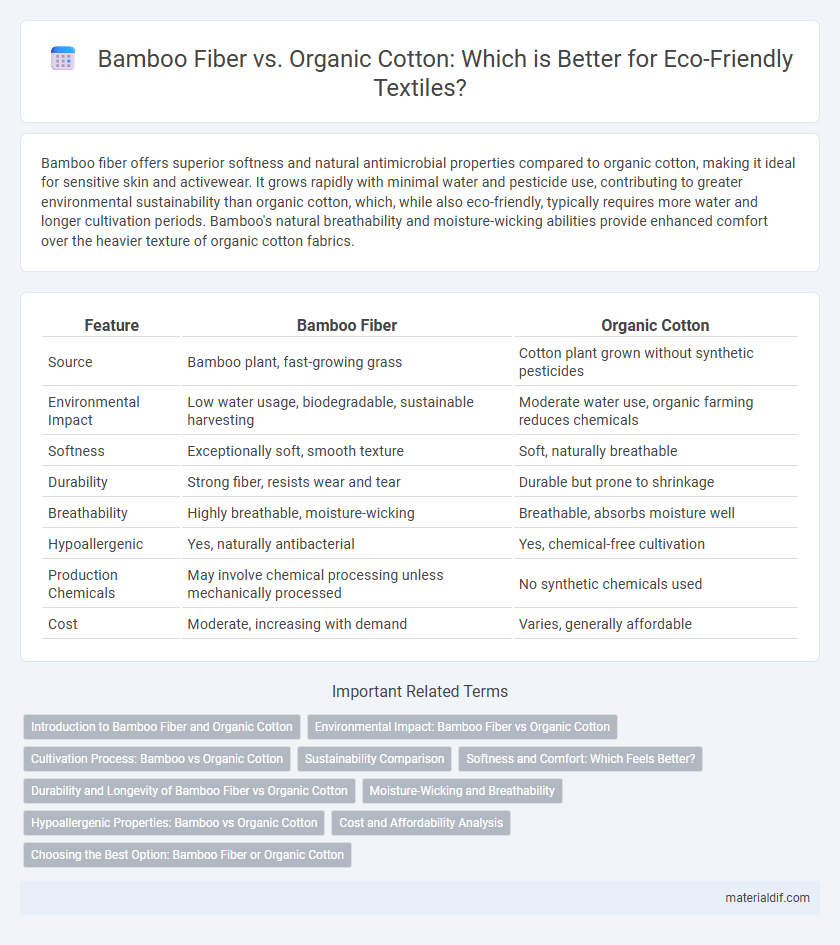Bamboo fiber offers superior softness and natural antimicrobial properties compared to organic cotton, making it ideal for sensitive skin and activewear. It grows rapidly with minimal water and pesticide use, contributing to greater environmental sustainability than organic cotton, which, while also eco-friendly, typically requires more water and longer cultivation periods. Bamboo's natural breathability and moisture-wicking abilities provide enhanced comfort over the heavier texture of organic cotton fabrics.
Table of Comparison
| Feature | Bamboo Fiber | Organic Cotton |
|---|---|---|
| Source | Bamboo plant, fast-growing grass | Cotton plant grown without synthetic pesticides |
| Environmental Impact | Low water usage, biodegradable, sustainable harvesting | Moderate water use, organic farming reduces chemicals |
| Softness | Exceptionally soft, smooth texture | Soft, naturally breathable |
| Durability | Strong fiber, resists wear and tear | Durable but prone to shrinkage |
| Breathability | Highly breathable, moisture-wicking | Breathable, absorbs moisture well |
| Hypoallergenic | Yes, naturally antibacterial | Yes, chemical-free cultivation |
| Production Chemicals | May involve chemical processing unless mechanically processed | No synthetic chemicals used |
| Cost | Moderate, increasing with demand | Varies, generally affordable |
Introduction to Bamboo Fiber and Organic Cotton
Bamboo fiber is derived from the pulp of bamboo grass, known for its natural antimicrobial properties, moisture-wicking ability, and eco-friendly cultivation requiring less water and pesticides compared to traditional crops. Organic cotton is cultivated without synthetic pesticides or fertilizers, promoting soil health and biodiversity, and is praised for its softness, breathability, and durability in textile production. Both fibers offer sustainable alternatives in the textile industry, with bamboo fiber standing out for its rapid growth cycle and organic cotton valued for its widespread adoption and natural comfort.
Environmental Impact: Bamboo Fiber vs Organic Cotton
Bamboo fiber production uses significantly less water compared to organic cotton, reducing strain on freshwater resources and minimizing environmental footprint. Bamboo's rapid growth and natural pest resistance decrease the need for chemical pesticides and fertilizers, unlike organic cotton which, while free of synthetic chemicals, still requires considerable water and land use. Both fibers offer eco-friendly alternatives to conventional cotton, but bamboo's efficient resource utilization and biodegradability present stronger sustainability credentials.
Cultivation Process: Bamboo vs Organic Cotton
Bamboo fiber cultivation requires significantly less water and no pesticides, thriving naturally in diverse climates while regenerating rapidly without replanting. Organic cotton, although grown without synthetic chemicals, demands considerable water and labor-intensive manual weed control to maintain soil health. The sustainable cultivation process of bamboo offers a more eco-friendly alternative compared to organic cotton's higher resource input and slower growth cycle.
Sustainability Comparison
Bamboo fiber outperforms organic cotton in sustainability due to its rapid growth rate and minimal water usage, requiring up to 70% less water than organic cotton cultivation. Bamboo plants naturally resist pests and diseases, eliminating the need for harmful pesticides and fertilizers that are often used in organic cotton farming. Furthermore, bamboo's ability to regenerate quickly without replanting enhances soil health and reduces land degradation, making it a more eco-friendly textile alternative.
Softness and Comfort: Which Feels Better?
Bamboo fiber is renowned for its exceptional softness, often described as silkier and smoother than organic cotton, making it ideal for sensitive skin and comfort-focused textiles. Its natural moisture-wicking and breathable properties enhance comfort by keeping the wearer cool and dry. Organic cotton, while soft and hypoallergenic, typically has a coarser texture compared to bamboo, which can affect the overall softness and feel.
Durability and Longevity of Bamboo Fiber vs Organic Cotton
Bamboo fiber exhibits superior durability and longevity compared to organic cotton due to its natural strength and resistance to wear and tear, making bamboo textiles more resilient in daily use and frequent washing. Organic cotton, while soft and breathable, tends to weaken faster and fade after multiple wash cycles, reducing its lifespan relative to bamboo fiber. The antimicrobial properties of bamboo also help preserve fabric integrity longer, contributing to its extended durability over organic cotton.
Moisture-Wicking and Breathability
Bamboo fiber exhibits superior moisture-wicking properties compared to organic cotton due to its micro-gaps that allow better absorption and evaporation of sweat. The natural structure of bamboo enhances breathability, promoting airflow and keeping the skin cooler and drier during physical activities. Organic cotton, while breathable, tends to retain more moisture, making bamboo fiber a preferred choice for high-performance and moisture management textiles.
Hypoallergenic Properties: Bamboo vs Organic Cotton
Bamboo fiber is naturally hypoallergenic due to its antimicrobial and moisture-wicking properties, reducing the risk of skin irritation and allergies compared to organic cotton. Organic cotton, while gentle and less chemically treated than conventional cotton, can still cause sensitivity in individuals with extremely delicate skin. The inherent antibacterial nature of bamboo fiber offers superior protection against allergens, making it an ideal choice for those prone to skin conditions or allergies.
Cost and Affordability Analysis
Bamboo fiber offers a cost-effective alternative to organic cotton due to its rapid growth rate and lower water consumption, reducing production expenses. Organic cotton requires more intensive farming practices, including pesticides and higher water usage, which elevates its market price. Consumers seeking affordable eco-friendly textiles often find bamboo fiber products to be more budget-friendly without compromising sustainability.
Choosing the Best Option: Bamboo Fiber or Organic Cotton
Bamboo fiber offers superior moisture-wicking properties and natural antibacterial benefits, making it an excellent choice for activewear and sensitive skin. Organic cotton, known for its breathability and environmental sustainability, is cultivated without synthetic pesticides, reducing chemical impact on ecosystems. Evaluating factors such as skin sensitivity, environmental footprint, and fabric durability helps determine whether bamboo fiber or organic cotton best aligns with personal and ecological priorities.
Bamboo fiber vs Organic cotton Infographic

 materialdif.com
materialdif.com